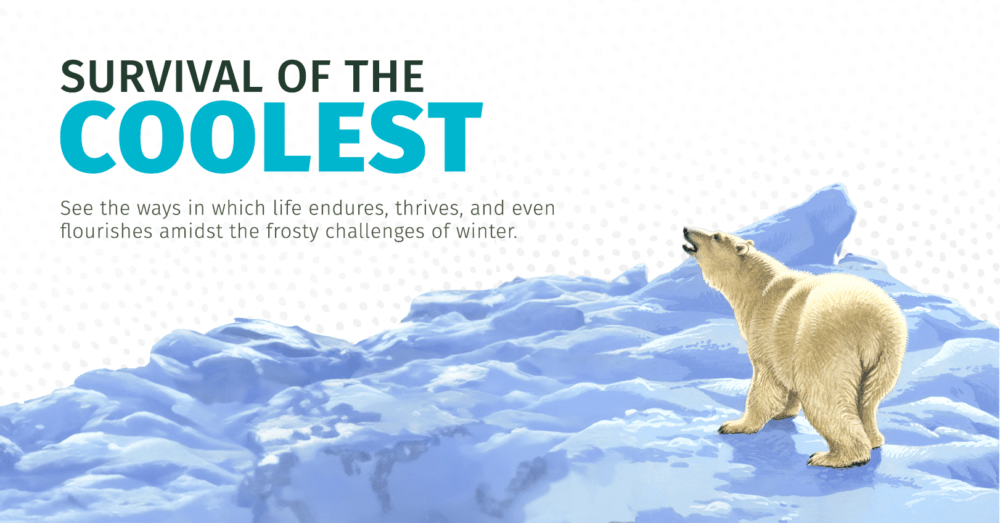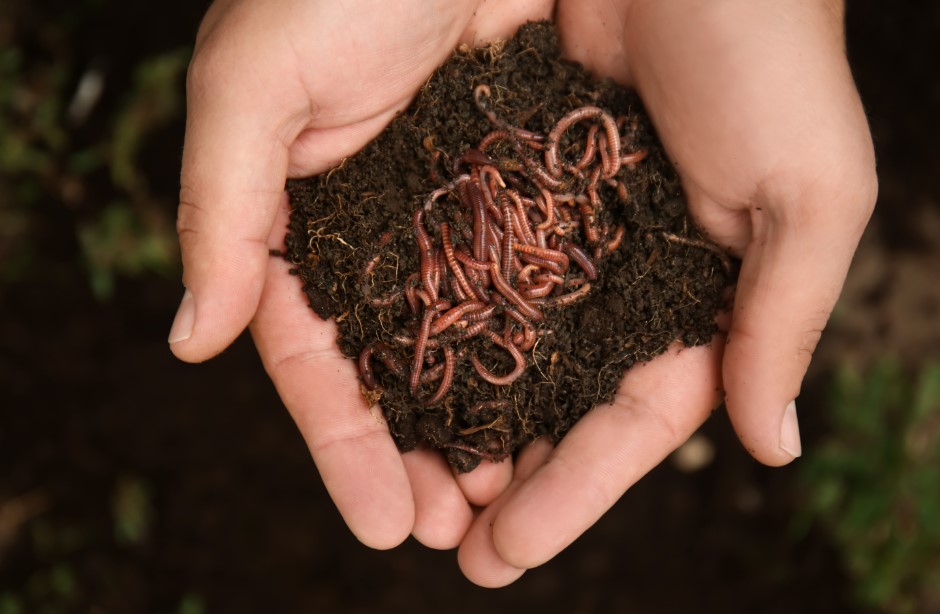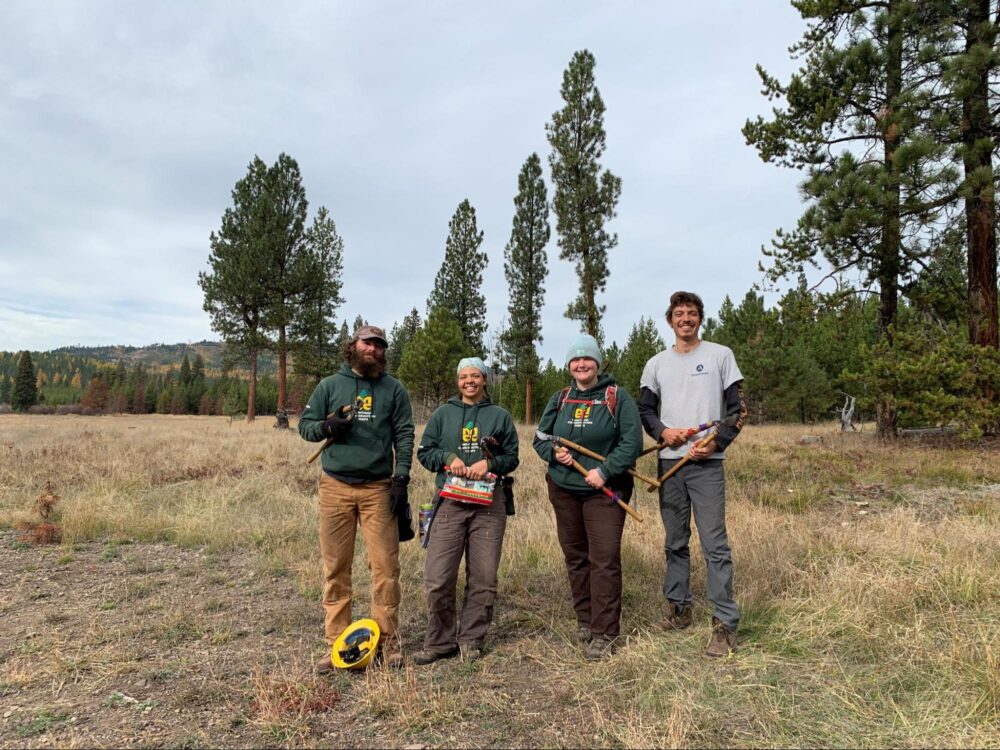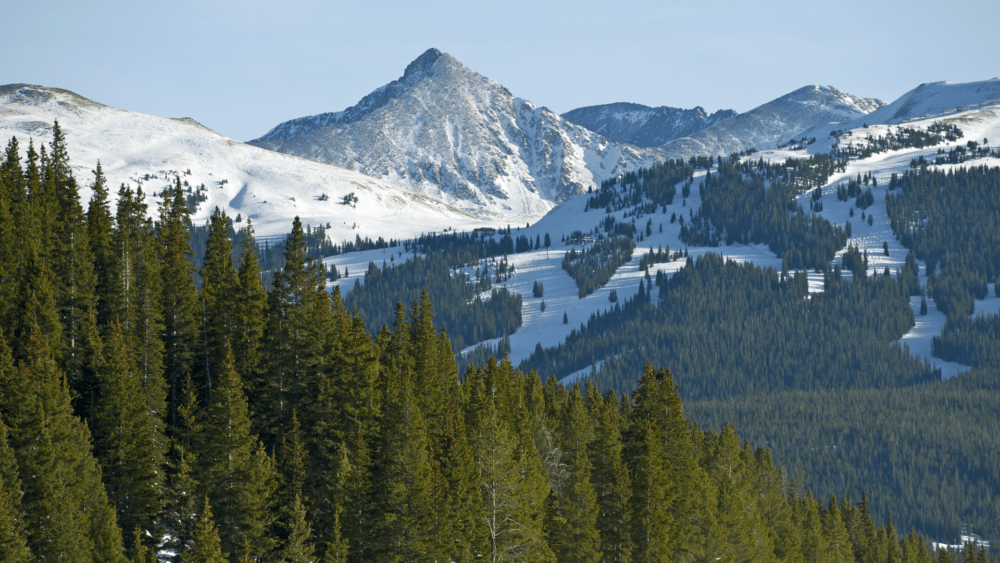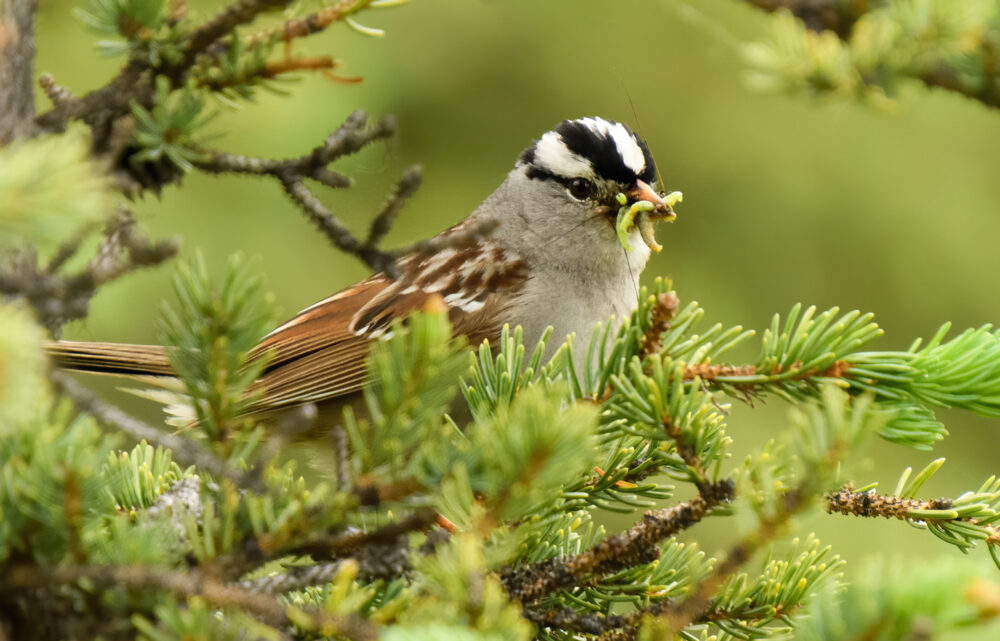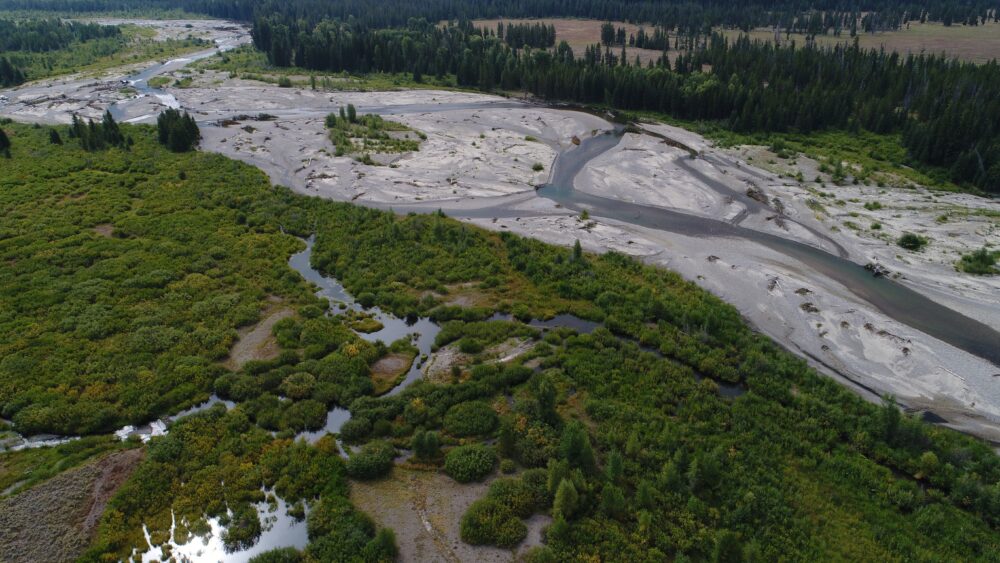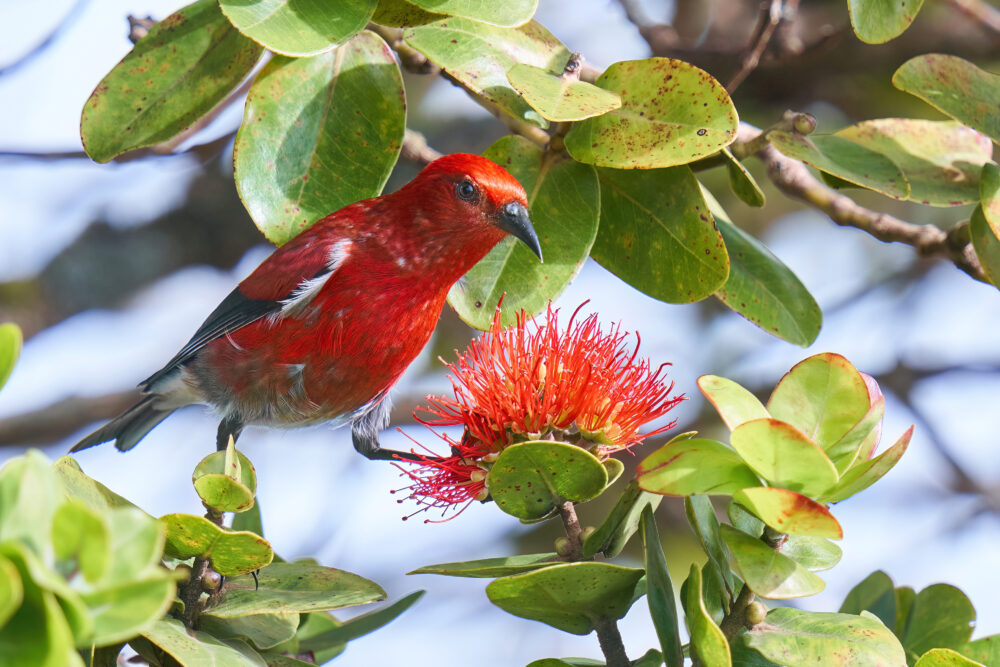We have much more to do and your continued support is needed now more than ever.
Don’t Call it a Man’s World: Women Can Fish Every Bit as Well as Men
When it comes to fishing, the lyrics to the James Brown hit song that “this is a man’s world” has historically been pretty accurate. With several notable exceptions, fishing was primarily the passion of males … but that was then and this is now. Fishing is becoming more popular with women, making the next lyrics in Brown’s song, “it wouldn’t be nothing without women or a girl,” a more accurate description of the sport of angling today.
This increased interest from women in pursuing fish with line and lure is easily documented. Over the last couple decades there have been numerous articles that look at women’s participating in fishing and fly fishing specifically, more women fishing guides, more manufactures and retailers developing practical lines of waders and other fishing gear for women, more fly fishing blogs written by women, more women’s fly fishing clubs, more women’s fishing charitable organizations, more women’s fishing events, and women are now making a name for themselves in pro fishing.
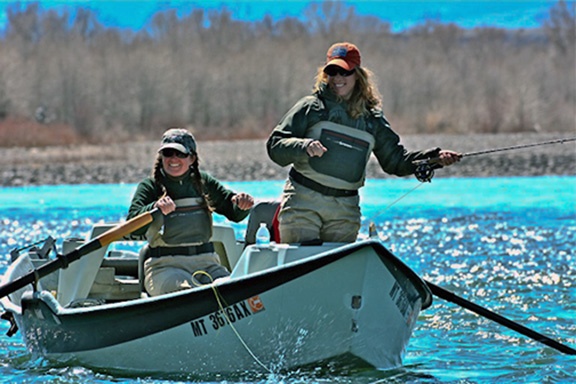
Women’s fishing participation may not be up significantly in the past 20 years, but the enthusiasm and passion for the sport from women who fish is undoubtedly at an all-time high. Unlike other sports where size, strength and speed may provide an advantage, in fishing those attributes rarely matter. Fly fishing especially has everything to do with skill, patience and even grace; arguably giving women an advantage.
When I decided to write about women’s involvement in fishing, and fly fishing specifically, it seemed a lot more appropriate for the story to come from the perspective of women, so I interviewed three different women fly anglers to get their thoughts on the sport and their advice for other women who are interested in learning to fly fish. 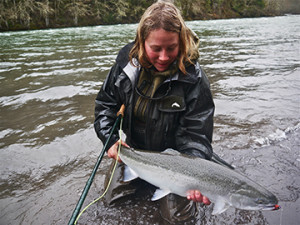 The voices for this article include two respected women guides who have established reputations in both fly fishing and fish conservation, along with a woman who just started fly fishing this year. They represent for the West Coast, East Coast and the middle of the country.
The voices for this article include two respected women guides who have established reputations in both fly fishing and fish conservation, along with a woman who just started fly fishing this year. They represent for the West Coast, East Coast and the middle of the country.
Mia Sheppard of Maupin, Oregon, and her husband Marty own Little Creek Outfitters, a fly-fishing guide service for steelhead and smallmouth bass. Mia is also a representative for the Theodore Roosevelt Conservation Partnership. She is the world’s top distance caster with a two-handed rod and currently holds the record 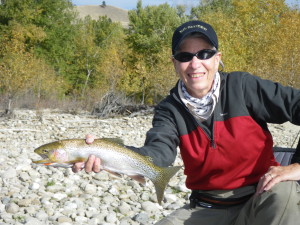 for longest cast by a woman of 144 feet. She is also on the pro staff of Simms, Costa, Airflo and Saracione.
for longest cast by a woman of 144 feet. She is also on the pro staff of Simms, Costa, Airflo and Saracione.
Kathleen (Kiki) Galvin of Falls Church, Virginia, is the owner/operator of Ms.Guided, a guiding and fly fishing service targeting trout and warmwater fish. Kiki is a member of Trout Unlimited’s Endorsed Business Program, International Women Fly Fishers and Federation of Fly Fishers. She is on Temple Fork Outfitters pro staff, and is a volunteer for Casting for Recovery, among several other fly-fishing and conservation organizations. 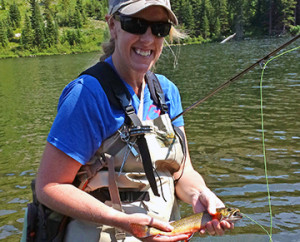 She says she loves fly fishing “so much I got a rainbow trout tattoo on my right ankle.”
She says she loves fly fishing “so much I got a rainbow trout tattoo on my right ankle.”
Bernadete Jensen of Denver, Colorado, is a sales support business manager for Cabela’s. Even though her father and brothers fished regularly while she was growing up in Montana, she didn’t have any interest in fishing until very recently. Four months ago she decided to start fly fishing on her own and now fishes at least once a week, targeting trout and bass.
How did you get into fishing and fly fishing specifically?
Mia: I’ve always loved being outside and on the water; it’s soothing and relaxing. I grew up gear fishing with family, and I saw fly fishing as something new and challenging. Since I was hanging out with people that were into fly fishing, it was a natural progression. Once I tried it, I really liked the dance on the water with a fly rod. Fly fishing is very graceful; for women especially, it fits very well. It’s not as clunky as gear fishing, and you don’t have to touch bait or that yucky stuff. With fly fishing there is a lot of mimicking nature, using fly patterns that look like bugs. Steelhead flies are gorgeous, and it’s so fun to look at the different patterns and colors. There is definitely an art to it.
Kiki: When I was little my family used to rent a cottage on a lake in New York State. I would collect worms and put them in a Maxwell House coffee can and store them in the fridge. My Dad and I would get up early in the morning and go down to the lake. He would perch me on the end of the wooden dock where I would dangle my toes in the water. After I moved to Virginia, I used to go and fish at some of the local put-and-take programs on the weekends in the 90s. A few of the anglers were fly fishing. I thought it was very graceful and enrolled in a one-day course. The rest is history.
Bernadete: Coming from a family geared toward hunting, I saw fly fishing as exciting way to reconnect with them, but I really didn’t want to kill animals. Fishing is great as it gets you very close to wildlife and you can practice catch and release if you want. It’s also very challenging, and that appealed to me.
What do you enjoy about fly fishing? What makes it rewarding to you?
Mia: I love being on the water, it grounds me. I also love teaching new anglers to cast and share these beautiful places with others. Some folks don’t get to see the amazing rivers we fish until someone takes them out, and it’s very rewarding showing people these absolutely gorgeous places. When they experience it for themselves, they become more interested and invested in that area. I enjoy showing folks the importance of taking care of these special places for future generations.
Kiki: For me personally the sport has given me a way to relax, to center myself, and to put it simply, “it just plain fills me up.” It has also given me a means to reach out, share my passion with others, to volunteer my time, and to become involved in the greater community. This is something I think we all should all strive to do in some capacity.
Bernadete: I enjoy that fly fishing gets me outside. I’ve been hiking into the Rocky Mountains to fish high lakes, and fishing in that beautiful environment is amazing because I have a love of nature. I also enjoy how challenging it is. There’s always something new to learn and I can always improve my cast. Catching my first fish was such a high that I was like, “I definitely need to that again.”
What are the biggest challenges you face as a fly angler? As a woman in fly fishing?
Mia: It used to be the stereotype of women don’t fish, or they just go fishing to hang out with their husbands or boyfriends, and that’s not true. It took quite a few years of building up my reputation as an angler—that I can do this and can take folks out and get them into fish. The fly fishing community is really starting to realize that this is a great sport for women as well, that we do kick ass, and the playing field is leveling out. On a physical level, there is some heavy lifting like getting boats on and off trailers. I’m strong, but depending on the angle of the boat trailer, it can be difficult, but you just ask for help, people and clients are gracious enough to extend a hand.
Kiki: The sport I love so dearly can still cause consternation among the genders for whatever reason. It is still a male-dominated sport, and with the increase of more women stepping into the stream, some men still believe it is not the place for women. With that being said, I think fishing can bring out the best in people, but without getting specific, it can also bring out the worst in people. I have witnessed both. I think most of the challenges in this day and age center around personal prejudices and overcoming them. I think somehow there is an aspect of ownership still maintained by some men that our waters and the fish that hold there are somehow theirs and not to be shared with the opposite gender. Women have been able to demonstrate physicality, skill level and understanding equal to their male counterparts for generations. I have always said the fish has no care as to who gender-wise is on the other end of the line. In fact, a trout told me once after I brought it to hand, “it was a pleasure meeting you my worthy adversary, but could you release me now so I can go back home.” A joke of course, but you get my drift. With all of that said, it is much more of a comfortable, accepting and respectful relationship than it used to be. I also would prefer to be referred to as an angler rather than fly fisherwomen/fly fisherman or anything else. If I am correct the word angler or angling came from anyone who creates an angle with the line from the tip of the rod to the fish’s mouth. There is no gender implied. I like that attitude!
Bernadete: My friends don’t fish and I don’t live near my family anymore, so finding someone willing to take me out and show me firsthand of what true fly fishing should look like was challenging. The people who are really passionate about the sport are the ones that make that happen. You have to have the ability to go to where the fish are, you have to get the right gear, and you have to know what to purchase. I was very fortunate because I got to try products out, but that’s still a hard decision to make. My friends have zero interest in fly fishing, so it’s been really tough because I don’t spend as much time with my friends then. Although, that’s also been rewarding because picking up a new hobby has allowed me to meet new people and make some new friends.
Is fly fishing for families? For kids?
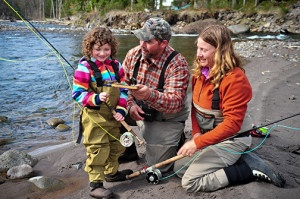
Kiki: It is a very graceful sport and almost anyone can master the technique with a bit of practice. You can fish or fly fish almost anywhere for all species of fish, which I think makes it an inclusive activity for all individuals, especially families. We are now living in the age of so much technology, and fishing is a way of getting our kids to look up from their phones and see the world around them again. I always say, “Fish live in beautiful places,” so fishing can immerse you in the wonder and beauty of nature and help reconnect one to the other. Also the joy of catching a fish is very rewarding and can be a very healing experience as well.
Bernadette: My dad was very surprised that I wanted to get involved in fishing after so many years of being exposed to it growing up but choosing not to participate. Fly fishing was new to my parents. They love fishing, but they don’t fly fish. The thought of fly fishing is that it can be a little pretentions and expensive to get into. My dad was surprised, but now he is very proud. We are having more father-daughter moments that fishing has made possible. Fishing is a great family activity, you are involved and engaged, it’s cost effective, and it’s a learning experience—not only how to fish, but also to be responsible in nature.
Why do you think fishing in general and fly fishing specifically has become more popular with women?
Mia: It’s really cool, because I see more women coming to me as a woman guide wanting instruction. Women feel more comfortable being around other women when they try something new. They may be a little self-conscious
around a guy, but when fishing with other women they are more likely to let their hair down. Fly fishing is super fun and graceful being on the water and connecting to the outdoors. It’s a tool to connect you with beautiful places, and it’s actually pretty simple once you get the right gear. It’s like yoga on the water, in that it’s good exercise and social. Fly fishing is something you can do with a group of your friends, and you can share these places and experiences with your friends. I’ve found that unlike men, women don’t necessarily need to catch fish to have a good time. They are usually not as serious as the guys, and are just out to have a good time and have fun with their friends.
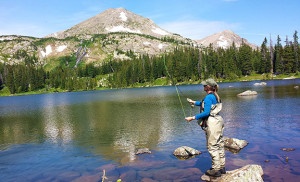
Bernadette: Women are getting more involved in a lot of things. Women are seeing that they have opportunities to participate in the activities that maybe were traditionally more male activities. Women are very independent these days, and we have a natural tendency to try something different and challenge ourselves. Plus moving in on the guy’s territory is a powerful thing for women. “Hey guys, we are going to challenge the status quo, and we are going to catch more fish.”
What advice would you give women who are just starting out in fly fishing?
Mia: Keep it fun and connect with fishing clubs. There are a lot of women-specific fishing clubs. You also have to stay at it. Once you pick up a rod, keep going to rivers and have confidence. Keep it simple, keep it fun, and keep it going.
Kiki: I usually share with them just as I did way back when: spend time reading, going to fly shows and clinics to learn your skills. Try to improve and realize the importance of knowing stream etiquette, which, by the way, I truly believe garners the respect of other fellow anglers no matter the gender. Join a conservation organization and a women’s fly fishing club. The process of self-improvement is a lifetime endeavor, and having a positive, inclusive attitude promotes harmony on the water no matter where you find yourself. Try to give back to the community in some way, and there are many opportunities to do that as we all know. Remember, everyone has the right to be out on the water enjoying the sport they love or have a passion for without question.
Bernadete: Don’t be afraid to ask questions. Find someone who fly fishes and who has experience. That way you can get a pretty good grip on the next steps you need to take. Lots of practice and don’t get frustrated. If you are interested in fly fishing, think of it as slow but steady development. You might get frustrated and want to quit, but hang around people who have gone through those experiences and find people willing to help you grow and learn.













